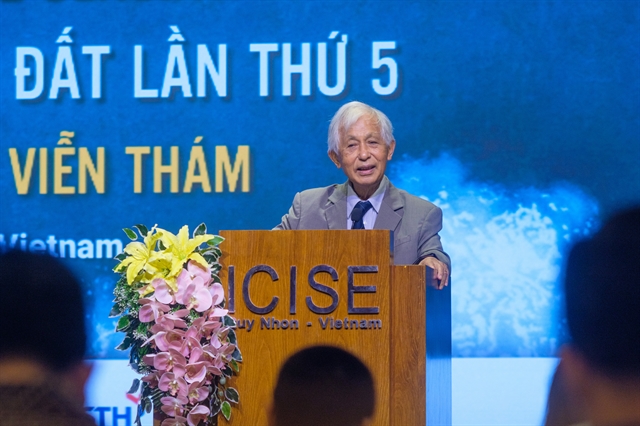 Society
Society

%20t%E1%BA%A1i%20Vi%E1%BB%87t%20Nam.jpg) |
| Sylvain Ouillon, head of the Vietnam Representative Office of the French Institute for Research and Development (IRD), presents at the 5th Vietnam School on Earth Observation (VSEO-5). Photos courtesy of ICISE |
HÀ NỘI Nearly 50 professors, scientists, young researchers, and students from France, the Philippines, and Việt Nam gathered on Monday to study, exchange, and practise advanced techniques in the field of Earth observation at the 5th Vietnam School on Earth Observation (VSEO-5), with the theme: Monitoring the ocean colour using remote sensing data.
The event took place on the morning of October 13, 2025, organised by the Rencontres du Vietnam (Meeting Vietnam) and the International Center for Interdisciplinary Science and Education (ICISE), in collaboration with the French Embassy in Việt Nam, the French National Research Institute for Sustainable Development (IRD), the French National Centre for Space Studies (CNES), and the Hanoi University of Science and Technology (USTH).
Ocean colour (or water colour) reflects the interaction between sunlight and particulate matter in the marine environment, such as phytoplankton, suspended solids, and organic and inorganic carbon. Phytoplankton play a fundamental role in the food chain and account for approximately 50 per cent of the Earth's biomass. Observing ocean colour from satellites allows for the estimation of optical-biological and biogeochemical parameters, reflecting species characteristics, phytoplankton morphology, and seawater quality. This is particularly important for coastal areas.
In this context, VSEO-5 aims to introduce and provide in-depth training on technology for measuring ocean colour radiance from space, in order to monitor the spatio-temporal variations of ocean color characteristics, focusing on coastal regions and practical applications in Việt Nam.
"The main goal of ICISE is to bring international scientists to Việt Nam, so they can share the latest discoveries with Vietnamese colleagues in a friendly and open atmosphere. This creates opportunities for meeting, working together, and generating new ideas," said Prof. Trần Thanh Vân, founder of the Rencontres du Vietnam and ICISE.
 |
| Prof. Trần Thanh Vân, founder of the Rencontres du Vietnam and ICISE delivers opening remarks at the VSEO-5. |
"This year is a special year for Vietnamese science," he said, "Last December, the Party General Secretary [Tô Lâm] launched a reform, making science and technology the foundation for national development with the Resolution 57. Việt Nam will invest strongly in science and attract overseas Vietnamese talents to return, and invite leading scientists from around the world to come and contribute."
This year's school is honoured to have the participation of many reputable scientists in the field, including: Prof. Cédric Jamet and Prof. Hubert Loisel from the Laboratory of Oceanography and Earth Sciences, University of Littoral Côte d'Opale (France); Prof. Sylvain Ouillon, Head of the representative office of the French National Research Institute for Sustainable Development (IRD) in Việt Nam; Remote Sensing Expert from GFD Company Đinh Ngọc Đạt; and Assoc. Prof. Dr. Nguyễn Thị Thu Hà from the University of Science, Vietnam National University.
The programme combines theoretical lectures, guided sessions, and practical field exercises. Additionally, the programme includes specialised reports by Vietnamese scientists presenting practical applications relevant to Việt Nam.
Delivering remarks at the opening ceremony, Attaché for University Scientific Cooperation at French Embassy in Hà Nội, Denis Fourmeau said "At a time when we are witnessing a rise in global tensions and conflicts, we must never forget that there can be no peace without science. Because science is a powerful catalyst for international exchange and for the sharing of common values — such as excellence, integrity, openness, and the creation of societal and economic value — it is, above all, an extraordinary and irreplaceable force for peace.
"By promoting meaningful mobility, science enriches our collective understanding of the world — something we need now more than ever. We need it especially at a time when science is increasingly being instrumentalised or even questioned by some major countries, both developed and emerging, particularly regarding its crucial role in multilateral environmental action."
The school is intended for researchers and data users, including postgraduate students, doctoral candidates, and young scientists interested in applying satellite data on ocean color and environmental changes in their research and professional activities.
Besides academic activities, the school also provides opportunities to establish research collaborations between reputable scientists and participants, as well as to exchange ideas and discuss new research topics in the field.
The school has been annually organised since 2017, aiming to build a community of young researchers and promote international scientific cooperation – applying space technology for sustainable development in Việt Nam. VNS